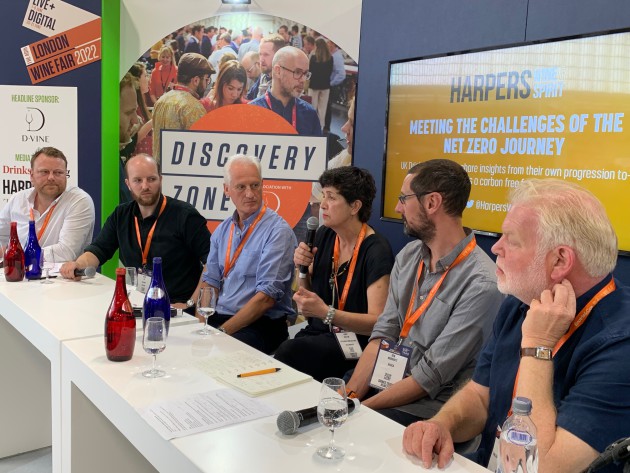
Wine world needs cohesive sustainability benchmark, says LWF Net Zero panel
The proliferation of sustainability accreditations for wine around the world is confusing for consumers and producers alike and the trade should look to create one benchmark standard by which a given bottle can be judged against its peers.
This was a bold proposition delivered by the panel at Harpers ‘Meeting the Challenges of the Net Zero Journey’ session at London Wine Fair (LWF), which brought together several leading protagonists in the drive for greater sustainability.
The headline discussion centred on panellists sharing insights from their own progression towards a carbon neutral future, including setting realistic and achievable goals, plus challenges and how to best communicate progress along such a path.
All agreed that transparent communication and sharing of best practice was an essential part of a Net Zero journey, but also that for both trade and consumers alike their needed to be great clarity in terms of how claims of progress made and targets met are defined.
“We have a wind turbine farm, some fantastic solar power, lots of innovation, but the one thing I’ve found is how do you measure it, how do you speak about it, because everybody has different KPIs,” said Mark Roberts, director of sales at Lanchester Wines and supporter to Harpers own Sustainability Charter.
“We produce considerably more [carbon free] energy than we use, but there doesn’t seem to be a commonality of language to communicate that… you almost need a unit of currency that resonates with consumers and trade, so that you can compare one bottle of wine against another,” he added.
Muriel Chatel, founder and MD of Sustainable Wine Solutions, also a signatory to Harpers Sustainability Charter, proved another strong proponent of a unified and easily comparable system that both trade and consumers can get their heads around.
“Common currency in communication [of sustainable credentials] is important,” said Chatel.
There are too many different schemes and accreditations around the world, making it very difficult to compare or understand,” she added.
Moreover, both Roberts and Chatel agreed that the proliferation of differing accreditation schemes, along with the “polluting noise” of claims on social media and elsewhere, allowed for greenwashing to flourish amidst a storm of often difficult to verify claims to be green.
The topic of alternative packaging also informed a significant part of the discussion, with Chatel calling out the industry for its resistance to change from heavy glass bottles to lighter weight alternatives.
“I don’t mean to shock anyone, but I think actually consumers don’t care as much and are ready for new formats – the problem lies more with the industry, which has dedicated its life to [glass bottles], so of course when things need to change all of a sudden, there is reluctance,” she added.
A full report on the 'Meeting the Challenges of the Net Zero Journey’ panel at LWF will appear in the July issue of Harpers.






